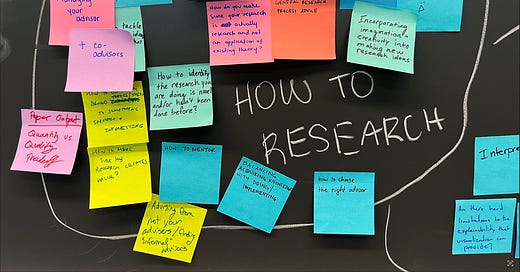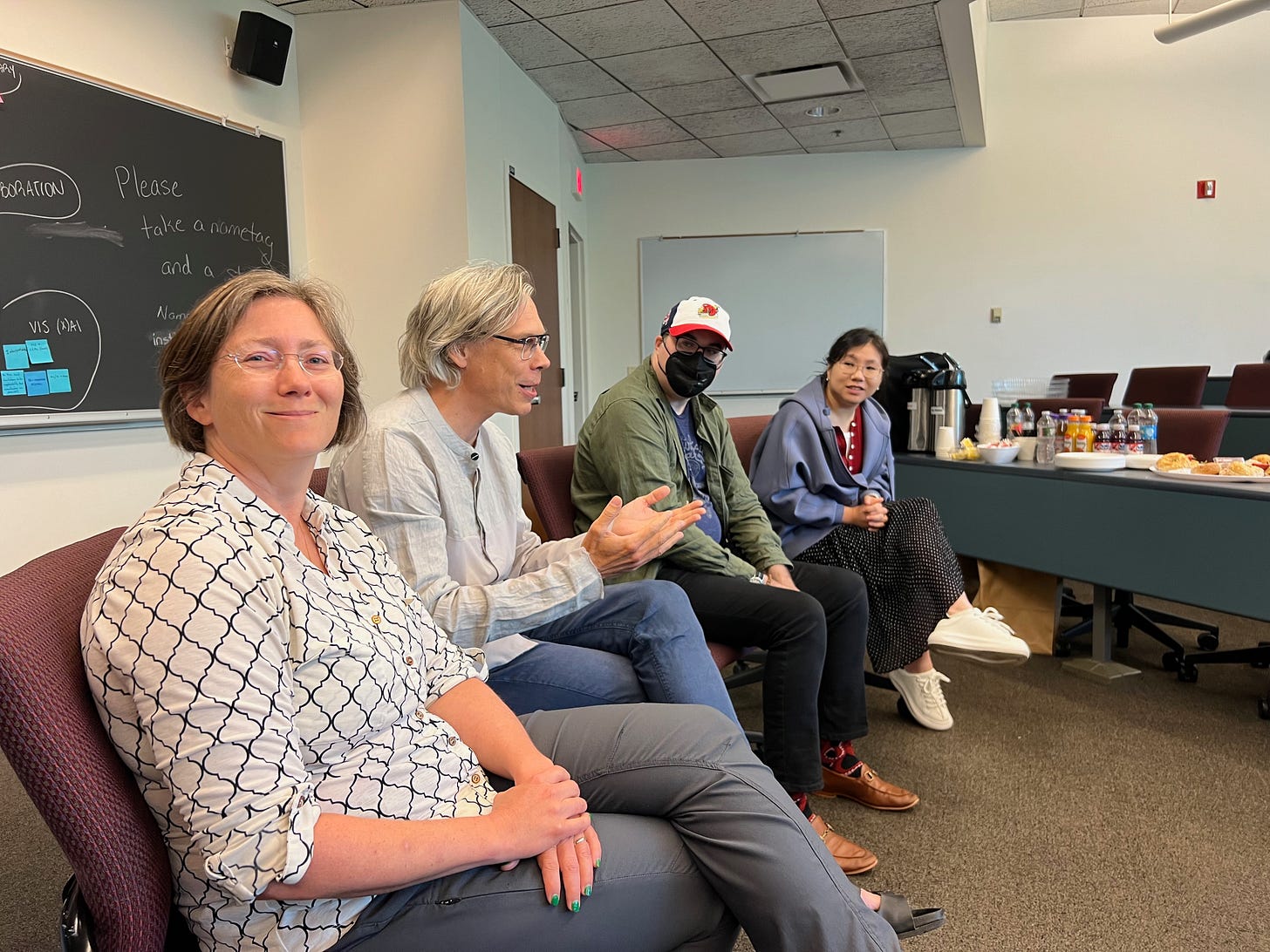Report from Boston Vis Summer School 2024
A summary of the event that took place between August 13-14, 2024
Last week, I participated in the Boston Visualization Summer School 2024, which we organized at Northeastern University. We organized the same type of event for the first time two years ago, and this year, we felt the time was right to organize a new edition. The event is a brainchild of Arvind Satyanarayan and me, but nothing could have happened without the help of our incredible student co-organizers, Sydney Purdue (Northeastern) and Dylan Wootton (MIT).
The summer school’s idea is to gather PhD students from the Boston area for two days to discuss data visualization research. The event is purposely organized to be led mainly by the students and adaptable in terms of topics to cover during the event.
This time, we had around thirty-five participants with a wide spectrum of academic seniority, from master students to students almost at the end of their graduate studies. We also had a few faculty members who helped us comment and advise the students.
Day 1
This year, we followed a structure similar to the one we had the first time. We started with short student and faculty presentations to make sure we all got acquainted with each other. This time, we asked students to spend a bit more time describing their research other than their personal backgrounds and interests so that we could get a sense of what type of work students did from the very beginning of the event.
The presentations were followed by an “unconference” session where everyone was encouraged to add on a board post-its about topics and ideas they wanted to discuss. We divided the board into two segments: personal topics (like career, work-life balance, and relationship with advisors) and research topics. Once this was done, our students organized the post-its into thematic groups, and we split up into working groups in separate rooms to discuss one of the selected topics. In the first session, we created two groups: “why research” and “efficient research.”
I can’t recall which one I attended, but I remember discussing the “imposter syndrome” within my group. I said that imposter syndrome often stems from comparing yourself to others, which I think comes quite naturally to all of us. I also shared my experience of feeling much less of an imposter over time by realizing how unique each of us is. If each of us has a unique set of traits and experiences, comparing ourselves to others may not make sense, and as a consequence, feeling an imposter also does not make much sense.
The day ended with a night event at a board games place. The event was restricted to the students so they could socialize without interference from the “old beards” like myself.
Day 2
On the second day, we started with student-led tutorials. We introduced this new element this year for the first time, and I think it worked well.
We had two tutorials. Camelia Brumar from Tufts gave a tutorial on using LLMs to “chat” with your own papers. Josh Pollock from MIT gave a tutorial on Bluefish, a JS library he developed to make it easy to specify diagrams through declarative language. Since the tutorials were given in parallel, I chose to attend the one from Camelia, but I am sorry I could not attend Josh’s. I am sure it was equally interesting.
Camelia’s tutorial was one of the highlights of the event for me. She shared with the participants a Colab notebook to walk us through how to set up an LLM and make it work with a document collection. I don’t have many opportunities to put my hands on code these days, so I really appreciated spending some time (faking) to write code. What struck me the most was how many libraries exist to set up incredibly powerful LLM pipelines. The tutorial also left me with a very deep conviction that I need to spend more time understanding some of the intricacies of how LLM and associated software infrastructures work.
The faculty AMA (“ask me anything”) panel followed the tutorials. Several faculty members participated as panelists, and the students asked questions about anything they were interested in. We used Slido as a platform to let students ask questions anonymously and to let them vote to select the most interesting questions. The panels went really well. Students asked some really hard questions, mostly about career and life advice, and I found the answers from the faculty very thoughtful. Here is a picture I took while participating in the panel.
Unfortunately, I can’t recall all the questions we received, but I remember voicing my opinion on two. The first was about deciding when to give up on a project and move on, and the second was about what popular trend we think is terrible. My answer to the first one is that some projects have a strange way of getting you excited, bored, and then excited again, following a few ebbs and flows. So, it is certainly a mistake to give up too soon. However, it is time to pull the plug when you become consistently uninterested in something and a continuous drag. Every researcher has multiple projects in parallel, and at some point, the opportunity cost of keeping a project alive becomes too high. Regarding the second question, I stressed my conviction (not restricted to visualization research) that we have an excessive focus on publications, often to the detriment of the quality and depth of the work. I really wish there was less emphasis on publishing and more on doing deep, deliberate, and careful work.
The next session after the AMA panel was another breakout group discussion based on the themes the students created on the board. The image below shows the research themes we generated.
We eventually selected three themes to discuss: Visualization and AI, Visualization Tools, and Ethical Visualization.
I decided to participate in the one on Visualization and AI. I have been and still am very active in this area, and I was curious to hear what the students had to share in the session. There are so many interesting problems in this space! While I can’t share the details of the projects the students discussed, I can share that I was left with an even deeper sense that the latest AI advances are a complete turning point and that we are learning how to look at visualization research through a new lens.
Reflections
I want to conclude with a couple of reflections. The event took place a few days ago, and the main thing it left in me was a deep gratitude for giving back. During my career, I received a lot of really good advice from people who were more senior than me, and some have been unbelievably generous. The summer school gave me once again a sense of how much uncertainty there is around the choice of having a career in research and how appreciative students are of the advice we give. One thing I noticed this time more than others is the beautiful dynamic between students at a different stage of their careers. It was great seeing master students contemplating the idea of starting a PhD and students who are closer to graduation and already so mature and self-directed. I have observed this dynamic with my students over many years, but seeing it play out during these two days made it even more vivid.
I am quite happy with the format we followed for the summer school. We basically reproduced the same format we used for the first edition, with the addition of tutorials. The unconference style makes things dynamic and fun, giving the students a sense of agency they deserve and need. I enjoyed the tutorials more than I expected, and I think we should include them again in the future. If, after reading this post, you want to organize a similar event, I strongly encourage you to reach out to us. The format works really, really well.
In this edition of the school, we had a more mixed set of students in terms of background. Since my appointment is between Computer Science and Design, two separate colleges at Northeastern University, I was particularly interested in having students and faculty from both colleges. I am happy that we had students from both colleges, contributing to an even more vibrant exchange of ideas.
Here is a beautiful picture of the whole set of participants, including students and faculty members.
I want to conclude by saying I want to keep organizing this type of event in the future. The same event in Boston may occur next year or in two years. I can say that organizing one after two years felt right, and we had a nice balance between new students and students who had already participated in the first edition. One dream I had for a long time was to organize a summer school in Italy. Maybe we could organize something equivalent every other year in some nice Italian town! As a PhD student, I attended a summer research school in Lipari (in Sicily), an incredible place. Another option is to organize it in Rome, which is my hometown. If you are Italian and have ideas about how and where to organize such a summer school, please send me a message. We need a location and a sponsor.
Thanks
I want to conclude by thanking the College of Art and Design and the Khoury College of Computer Sciences at Northeastern for sponsoring the event. Thanks to them, we had room, food, and some nice events for the students at night.
Finally, I want to extend my deepest gratitude to Dylan and Sydney for being the real organizers of the event. Arvind and I mostly worked as advisors, and they did the bulk of the work. It was a pleasure to see them organize and direct the event so professionally during the two days.







Very interesting, thank you so much. I would like to write you an email regarding the newsletter, may I have your email address, please?
Thank you!